Speaker Information
Desi Alexander
Desi Alexander is the Audiovisual Collections Coordinator for Cornell University Library. She is currently heading a five year initiative to prioritize the library’s at-risk magnetic media for digitization and preservation, and continues to work toward developing sustainable workflows to make University content discoverable and accessible. She received her MSIS in Archival Studies at SUNY Albany.
Audrey Amidon
Audrey Amidon began working in the Motion Picture Preservation Lab at the National Archives and Records Administration in 2006. She completed the film archive M.A. program at the University of East Anglia.

Criss Austin
Criss Austin is the supervisor of the Motion Picture Preservation Lab at the National Archives and Records Administration (NARA). Over the course of the last decade she has overseen preservation and digital restoration projects and recently completed digital preservation of William Wyler’s outtakes from The Memphis Belle: Story of a Flying Fortress and Eva Braun’s home movies. She is an active participant in multiple moving image professional organizations and in creating technical guidelines for archives, libraries, and museums. She holds degrees from Oberlin College, The Nottingham Trent University, and The L. Jeffrey Selznick School of Film Preservation.

Chris Bañuelos
Chris Bañuelos decided a long time ago, in a galaxy far, far away, that he needed to find a job. Preferably one that he liked. As an avid devourer of the cinematic arts, he eventually found his way to earning a Bachelor’s degree in Film and Media Studies from the University of California, Irvine. While there, a guest lecture by the inimitable Ross Lipman inspired Chris to pursue an education in film preservation. As such, Chris was accepted to and graduated from NYU’s MIAP program. After receiving his Master’s from NYU, Mr. Bañuelos found some grant-funded freelance work in New Orleans (including at Tulane University and the National WWII Museum) before heading back to Los Angeles, the Motherland. In LA, he worked for Time Warner Sportsnet and Sportsnet LA, the respective cable networks for the Lakers and Dodgers sports teams. Next, he found his way to Culpeper, Virginia working at the Packard Campus of the National Audio-Visual Conservation Center. Currently, Chris is the Audio-Visual Preservation Specialist for the University of Kansas. Suffice to say, Mr. Bañuelos liked all of these jobs. Each one of these positions has allowed Chris to not only use what he’s learned but continue to learn new skills and stay informed with the latest and greatest developments in media conservation and preservation.

Charlotte Barker
Charlotte Barker has worked at Paramount Pictures since 2005, and was a key player in ushering the studio into the digital age. Currently, she works as the Lead Media Archivist in the Preservation and Restoration department, where she spends her time working on the best movies you’ve never heard of. When she’s not busy preserving films, Charlotte can be found in her cowboy themed office editing together reels that highlight the hidden gems of the Republic Pictures catalog. Her work has been shown everywhere from TCM Festivals in Hollywood, California to a giant LCD screen in Times Square. Her current hobbies include restoring Heywood Wakefield furniture and tending her cactus garden.
 Snowden Becker
Snowden Becker
Snowden Becker (she/her) holds a BFA in Printmaking from the Maryland Institute, an MLIS from UCLA, and most (but not all) of a PhD from UT Austin’s School of Information. She is a co-founder of the international Home Movie Day event and the nonprofit Center for Home Movies, which was awarded the Hamer-Kegan Award for Archival Advocacy by the Society of American Archivists in 2017. From 2012 to 2019, she managed graduate degree programs in media archiving and library and information science at UCLA. Snowden regularly teaches and consults in the areas of heritage preservation, collections administration, and professional development, and is honestly happy to help anyone who asks, because people helping her is how she got where she is today.
 Becca Bender
Becca Bender
Becca Bender is the Film Archivist and Curator of Recorded Media at the Rhode Island Historical Society. The RIHS has a 9 million foot film collection that is largely comprised of four local newsfilm collections from Providence, RI. Becca holds a master’s degree from NYU’s Moving Image Archiving and Preservation program. Prior to becoming an archivist, Becca worked for many years as an archival producer on documentary films, specializing in African American history and culture. Her most recent documentary project, the Emmy-nominated Black America Since MLK: And Still I Rise, is a four-hour PBS series covering the past 50 years of black American history. Other PBS films include Peabody Award-winning Chisholm 72 – Unbought & Unbossed, Emmy-nominated Cancer: The Emperor of All Maladies, and Beyond the Steps: Alvin Ailey American Dance Theater.
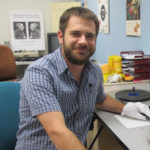 Tyler Bequette
Tyler Bequette
Tyler Bequette is the film preservationist for the Washington University Film & Media Archive, where he has managed all film preservation efforts since 2015. He received his training at the L. Jeffrey Selznick School of Film Preservation at George Eastman House in Rochester, New York, in 2014, and a B.A. in Film and Media Studies from Washington University in St. Louis in 2013.
 Tre Berney
Tre Berney
Tre Berney is the Director of Digitization and Conservation at Cornell University Library, overseeing the Audiovisual Preservation Lab, the Imaging and Scanning labs and the Conservation Lab. His foundational background is in audiovisual production, digitization, and preservation of collections and time-based media. Prior to his career in libraries, Tre worked in production, post, and preservation for cable television clients (Discovery, A&E, Biography, The History Channel), The Smithsonian Institution, The Howard Baker Center on Public Policy, The Highlander Center, and others.
 George Blood
George Blood
George Blood graduated from the University of Chicago (1983) with a Bachelor of Arts in Music Theory.
- The only student of pianist Marc-André Hamelin.
- Recorded over 4,000 live events since 1982
- Recording Engineer for The Philadelphia Orchestra for 21 years
- Recorded and edited some 600 nationally syndicated radio programs
- Recorded or produced over 250 CDs, 6 of which have been nominated for Grammy Awards
- An active teacher and presenter at conferences, presented on research into workflow, best practices, metadata, authentication, and interchangeability of digital information
- Served on standards committees for MXF AS-07 (now SMPTE RDD48), and is a writer two chapters for IASA TC06.
Mr. Blood and his wife, Martha, have five children and five grandchildren. An unapologetic preservationist, at the end of a day of Preserving the Sound and Motion of History, he goes home to his 1768 house where he practices harpsichord and reads books on paper.
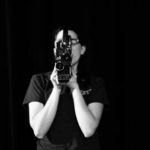 Meghan Bouffard
Meghan Bouffard
Meghan Bouffard (she/her/hers) is a current graduate student at Simmons University working towards her Master’s in Library and Information Science with a concentration in archives management. She has a Bachelor of Arts in Film Studies from Keene State College, completed in 2015. Due to her film education background and passion for cinema, much of her graduate work has revolved around her interest in moving image archives. Special areas of interest are film projection and sustaining the practice, analog media, and film exhibition and programming.
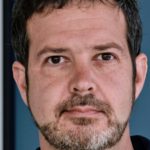 Rob Callahan
Rob Callahan
Rob Callahan Callahan serves as the national organizer for the Motion Picture Editors Guild, Local 700 of the International Alliance of Theatrical and Stage Employees (IATSE). The Guild represents 8,300 members nationwide, primarily post-production professionals. Previously, Callahan worked as a national representative for the American Federation of Teachers. Callahan’s involvement in the labor movement dates back to the nineties, when, as a graduate employee teaching courses in English composition and literature at Temple University, he and his colleagues began to organize. The union they founded became AFT Local #6290, the first graduate employee union in the state of Pennsylvania.
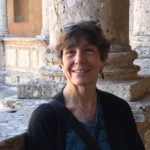 Karen Cariani
Karen Cariani
Karen Cariani is The David O. Ives Executive Director of the WGBH Media Library and Archives and WGBH Project Director for the American Archive of Public Broadcasting, a collaboration with the Library of Congress to preserve and provide a centralized on-line access to content created by public media over the past 70+ years. Karen has 30 plus years of television production, project and archival management experience and was project director for recent projects a such as Improving Access to Time-Based Media through Crowdsourcing & Machine Learning, National Digital Stewardship Residency, National Educational Television Collection Catalog Project, and Building Infrastructure and Capacity for the American Archive of Public Broadcasting. Past projects include the Boston Local TV News Digital Library project and Project Director of the guidebook “Local Television: A Guide to Saving Our Heritage. She serves on the National Stewardship Digital Alliance (NDSA) Coordinating Committee. She is active in the archive community and professional organizations and passionate about the use of media archives and digital library collections for education.
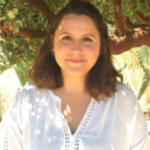 Amanda Castro
Amanda Castro
Amanda Castro received her education from California State University San Bernardino. She has a Bachelors in Social and Behavioral Science with an emphasis in Public and Oral History. She received her Masters in Social and Behavioral Science and Globalization with a emphasis in Public History. She was the project manager for the creation of Patton State Hospital’s Museum and Archive in Patton, California. She has worked on various historical projects in the Inland Empire including working with Citrus State Historical Park on a Relevancy in History Program and worked with the City of Riverside to complete a historical context statement for Chinese American history in Riverside, California. She is currently the Museum Director at Malki Museum located on the Morongo Reservation in Banning, California.
 Tuni Chatterji
Tuni Chatterji
Tuni Chatterji is the Production Coordinator of the Oral History Projects department at the Academy of Motion Pictures Arts and Sciences. She is a filmmaker, and has many years of experience as an educator, a video editor and as a production manager specializing in dubbing and subtitling. Her films have screened at festivals and universities around the world and most recently at the Museum of Contemporary Art in Los Angeles. In 2007, Tuni was granted a Fulbright scholarship to make Okul Nodi (Endless River), an experimental documentary about the boatman’s song of Bengal. Tuni recieved an MFA in filmmaking from California Institute of the Arts and she holds a BFA in painting from the University of Tennessee, Knoxville. Tuni currently serves on the board of the Los Angeles Filmforum and has since 2017.
 Meg Cheman
Meg Cheman
Meg Cheman, has over 20 years of experience working with the Buffalo & Erie County Public Library. She began serving as head of the Special Collections Department in 2011. Cheman also currently chairs the Library’s Digitization Committee and oversees all system-side digital proposals and projects. Recent projects include a year-long exhibit featuring the Library’s extensive Slavery Collection. Through programming and outreach enriched by locally produced TV news documentaries, the Slavery exhibit incorporates the Buffalo story of activism, abolitionism and the Underground Railroad.
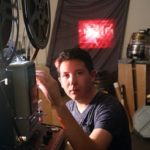 Spencer Christiano
Spencer Christiano
Spencer Christiano (he/him/his pronouns) is Chief Projectionist of the Moving Image Department at the George Eastman Museum, where he oversees technical operations in two archival exhibition spaces. He has taught the techniques of film inspection and projection at the L. Jeffrey Selznick School of Film Preservation, the National Film Archive of India, the Pordenone Silent Film Festival, and the University of Rochester. He is a co-editor and co-author of The Art of Film Projection: A Beginner’s Guide (2019), a comprehensive outline of the materials, equipment, and knowledge needed to present the magic of cinema to an audience. His work as a playwright includes Endangered Features (2016), a one-person show about the world of film archiving, film projection as a technical art, and the evolution of cinema exhibition from its analog roots to cutting-edge digital.
 Kathryn Claypool
Kathryn Claypool
With over 10 years’ experience as a Business Analyst and Project Manager, Kathryn brought her skills to the entertainment industry in 2013. At Paramount Pictures, she has managed daily inventory operations for new titles, coordinated metadata taxonomy for inter-operability, and ran first line support in World Wide Technical Operations for the digital asset management system (ALIAS). She has managed several legacy system migration projects over the years, including those for health science data as well as the largest content migration project at Paramount Pictures.
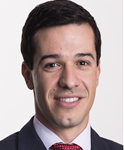 Rodrigo Coelho
Rodrigo Coelho
Rodrigo Coelho is the Product Manager for Iron Mountain InSight, an Intelligent Content Platform that combines Machine Learning with Data Governance.
Jesse Crooks
Jesse Crooks is the Director of Operations for Renew Theaters, Inc., a nonprofit organization that runs four historic arthouse theaters in Pennsylvania and New Jersey. He serves as head projectionist and helps coordinate the Ambler Theater’s annual 35mm film festival. He also oversees their motion picture technology collection, which includes working projectors that date back to the silent era. He has been a 35mm projectionist since 2006 and hopes to keep film projection alive for many years to come.
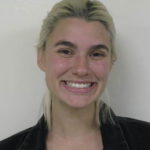 Julia Davila-Coppedge
Julia Davila-Coppedge
Julia Davila-Coppedge is a Master of Science in Information Studies (MSIS) Candidate at the University of Texas at Austin. She works as the User Services Graduate Research Assistant at the Nettie Lee Benson Latin American Collection by day and as a projectionist at the Alamo Drafthouse cinema by night. This summer she interned at the University of Kansas’ Kenneth Spencer Research Library, where she worked with a local access program called As Time Goes By from the Channel 6 Collection.
 Laura Drake Davis
Laura Drake Davis
Laura Drake Davis is a Digital Specialist at the Library of Congress in the Moving Image Section. In this role, Laura processes born-digital moving image content, develops new workflows for born-digital content and develops strategies for metadata capture and transformation. Laura brings a wide range of experience to this role, with previous positions in college and university archives, special collections, and state government archives. A certified archivist since 2007, Laura holds the Master of Library Science degree from the University of Maryland College Park.
Rachel Del Gaudio
 While attending Chapman University for a degree in Film Studies, Rachel spent summers interning at film archives. Those lost summers paid off when she was offered a position at the Academy Film Archive in 2007 to work with their nitrate film collection, and then subsequently landed a job at the Library of Congress in their Motion Picture division in 2009. During her time at the Library, she has worked in the vaults, processed collections, inspected prints for film loans and has worked to barcode the vast collection. The most rewarding project has been co-creating and orchestrating “Mostly Lost,” the annual workshop that is dedicated to identifying unknown films from around the world. The workshop is an organic extension of the Flickr page that she created in 2008 as chair of the Nitrate Committee that serves the same purpose.
While attending Chapman University for a degree in Film Studies, Rachel spent summers interning at film archives. Those lost summers paid off when she was offered a position at the Academy Film Archive in 2007 to work with their nitrate film collection, and then subsequently landed a job at the Library of Congress in their Motion Picture division in 2009. During her time at the Library, she has worked in the vaults, processed collections, inspected prints for film loans and has worked to barcode the vast collection. The most rewarding project has been co-creating and orchestrating “Mostly Lost,” the annual workshop that is dedicated to identifying unknown films from around the world. The workshop is an organic extension of the Flickr page that she created in 2008 as chair of the Nitrate Committee that serves the same purpose.
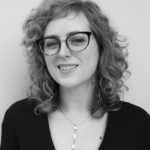 Caitlin Denny
Caitlin Denny
Caitlin Denny is an archivist and filmmaker. She earned a Master’s degree in Library and Information Science from UCLA in 2017, and a BFA degree in Media Arts from California College of the Arts in 2009. She currently works as a Senior Media Archivist in the Stills Archive at Paramount Pictures in Los Angeles.
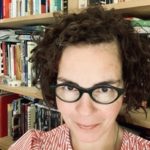 Melissa Dollman
Melissa Dollman
Melissa is a PhD candidate at the University of North Carolina at Chapel Hill in American Studies. She has been an audiovisual archivist, intern, volunteer, adjunct faculty, exhibit developer, and researcher for cultural heritage institutions including Women In Film Foundation, UCLA Film and Television Archive, Academy Film Archive, Schlesinger Library at Harvard University, State Archives of North Carolina, and North Carolina State University. She has authored short pieces for The Moving Image, a chapter in Amateur Movie Making: Aesthetics of the Everyday in New England, 1915-1960, as well as videographic essays Cue the Women (2015) and Gone Estray (2019). She has been an AMIA board director since 2016, and co-chairs the Publications Committee.
 Sarah Eilers
Sarah Eilers
Sarah Eilers oversees the Historical Audiovisuals (HAV) collection in the History of Medicine Division at the U.S. National Library of Medicine. The collection includes about 10,000 cataloged medical and scientific titles in film, tape, and other formats, and about 4,000 unprocessed titles. Sarah handles donors and accessions, selects and prepares titles for NLM’s Digital Repository, manages the website Medicine on Screen, catalogs and describes holdings, and promotes and provides reference service for the collection. She’s worked as an archivist in the History of Medicine Division since 2005 and as head of HAV since 2015.
 Meghan Fitzgerald
Meghan Fitzgerald
Meghan holds an MLS from the University of North Carolina’s School of Information and Library Science in Chapel Hill. For eight years, Meghan brought her background in library and information science to the media and entertainment industry, developing data models, metadata schemas, controlled vocabularies, and digital archives as a Media Content Analyst at Turner Broadcasting and then as a Manager of Metadata & Asset Management in the HBO Archive. In 2016, she became the metadata librarian and taxonomist for the Earth Observatory group at NASA Goddard Space Flight Center in Maryland. Meghan is also a freelance writer and game developer for Onyx Path Publishing and other tabletop game companies. She is the developer for Changeling: The Lost and has worked on over 40 books for various game lines.
 Claire Fox
Claire Fox
Claire Fox is a graduate student at New York University, where she is studying audiovisual archiving in the Moving Image Archiving and Preservation program with a focus on digital preservation. Claire got her start in the archival field working at Deluxe Archive Solutions in Seattle, Washington, where she was an assistant negative cutter and worked on packaging digital assets. She is currently an intern at the Metropolitan Museum of Art, where she is collaborating on an obsolescence risk assessment for the museum’s non-accessioned audiovisual holdings. This past summer, she was an intern at Yale University Library Digital Preservation Services, writing documentation for a unique software preservation initiative called Emulation-as-a-Service Infrastructure. Previously, she was an intern at the New Museum, where she worked on web archiving documentation, and at IndieCollect, where she worked on the Queer Cinema Index.
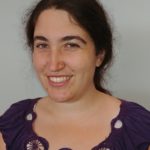 Rebecca Fraimow
Rebecca Fraimow
Rebecca Fraimow is the Digital Ingest Manager at the WGBH Media Library and Archives and the American Archive of Public Broadcasting, where she oversees digital archiving workflows, the Public Broadcasting Preservation Fellowship program, and the development of the PBCore metadata standard. Rebecca was a founding member of New York City’s XFR Collective, a nonprofit organization supporting the preservation of at-risk audiovisual media, and previously managed the Dance Heritage Coalition’s NYC Digitization Hub.
 Caroline Frick
Caroline Frick
In addition to serving as an Associate Professor in the Radio-TV-Film Department at The University of Texas at Austin, Caroline Frick is the founder and Director of the Texas Archive of the Moving Image. Prior to her work in Texas, Dr. Frick worked in film preservation at Warner Bros., the Library of Congress, and the National Archives. Dr. Frick also programmed films for the American Movie Classics cable channel in New York and served for four years as the President of the Board for the Association of Moving Image Archivists. Her book, “Saving Cinema,” was published in 2011 by Oxford University Press. She has published in a variety of journals including the International Journal of Heritage Studies, The Moving Image, The Historical Journal of Film, Radio and Television, and The Journal of Popular Film and Video.
 Catherine Gadbois-Laurendeau
Catherine Gadbois-Laurendeau
Catherine Gadbois-Laurendeau is the Head of Access to Collections at the Cinémathèque Québécoise. In addition to her Master Degree in Museum Studies, Catherine holds a Bachelor’s degree in Environmental Geography and a Bachelor’s degree in Literature and Film, all from University of Montreal. Prior to her career at the Cinémathèque Québécoise, she was a Research Assistant at TECHNES, an international research partnership on cinema techniques and technologies, where she was managing the copyrights for the free and collaborative encyclopedia of the project. As of today, her main research interests are digital preservation of moving image and theory of film restoration, two large aspects of her job at the Cinémathèque Québécoise.
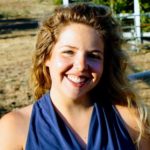 Hannah Garibaldi
Hannah Garibaldi
Hannah Garibaldi is a PhD student in Film and Media Studies at UC Santa Barbara. She received her Master’s degree in Film Studies from Chapman University, and her academic research interests include the establishment of accessibility standards in cinematic exhibition and the influence of physical illness, injury, and disability on historical Hollywood film productions. Hannah is professionally involved in audiovisual archiving, having worked at the Paley Center for Media, the UCSB Library’s Special Research Collections, and as an Archive Manager at the UCSB Film and Media Studies Film Archive.
 Alison Reppert Gerber
Alison Reppert Gerber
Alison Reppert Gerber is the Preservation Coordinator for the Smithsonian Institution Archives (SIA) in Washington, DC. At SIA, she oversees all preservation-related activities, which include collection need and risk assessment, preventive conservation tasks, budgeting and procurement, and long-term preservation strategies and initiatives. Since coming to the Archives in 2015, Alison has led a pan-institutional audiovisual survey that was completed in 2017, and is now managing an audiovisual preservation readiness assessment for eleven participating Smithsonian units. Prior to coming to SIA, Alison was a conservation technician for the Baltimore Museum of Art (BMA) and then the National Museum of African American History and Culture (NMAAHC). Alison received her bachelor’s degree in Art History, with minors in Chemistry and Religious Studies, from Seton Hill University in 2009, and went on to receive her master’s degree in Museum Studies from Johns Hopkins University in 2014.
 David Gibson
David Gibson
David Gibson is a Library Technician in the Library of Congress Motion Picture, Broadcasting and Recorded Sound Division. He was a member of the inaugural class of UCLA’s Moving Image Archive Studies Master’s program, earning his degree in 2004. In 2006, he began working with the Library of Congress’ video game collections and continues to perform cataloging, preservation and outreach activities in an effort to build the collection and to increase awareness of the processes involved in preserving complex digital objects.
 Karen F. Gracy
Karen F. Gracy
Dr. Karen F. Gracy is an associate professor in the School of Information at Kent State University. She possesses an MLIS and PhD in Library and Information Science from the University of California, Los Angeles and an MA in critical studies of Film and Television from UCLA. She is co-editor-in-chief of Preservation, Digital Technology and Culture, and recently edited Emerging Trends in Archival Science, a collection of research presented by scholars at the 2016 AERI conference held at Kent State. Dr. Gracy’s scholarly interests are found within the domain of cultural heritage stewardship. She is currently investigating the importance of psychomotor skills development in the education of audiovisual archivists as part of a larger research project to develop competencies for the AV archiving field. As part of this project, she recently published “Holistic Competency Development and the Significance of Learning Domains in Audiovisual Archiving Education,” which appeared in a Fall 2018 special issue of Education for Information on nontextual pedagogies in information studies.
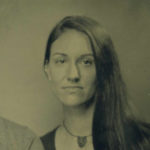 Siobhan C. Hagan
Siobhan C. Hagan
Siobhan C. Hagan was born and raised in Maryland and holds her M.A. in Moving Image Archiving and Preservation (MIAP) from NYU’s Tisch School of the Arts. She has worked in a variety of collecting organizations throughout her career, including the UCLA Library, the National Aquarium, and the Smithsonian Institute. She is currently the Project Manager of the Memory Lab Network at the DC Public Library. In addition to this, Siobhan is the founder, CEO, and President of MARMIA (the Mid-Atlantic Regional Moving Image Archive). She has been active as a member of the Association of Moving Image Archivists (AMIA): she is currently Co-chair of the Local TV Task Force, was a chair of the Regional Audio-Visual Archives Committee from 2013-2018, and was an AMIA Director of the Board from 2015-2017.
 Kendell Harbin
Kendell Harbin
Once a Floridian, Kendell Harbin relocated to Kansas City, MO in 2009 to attend the Kansas City Art Institute. Working at the intersection of art and archives, she has been known to wear many hats: teaching artist, preservationist, curator, grant writer, moonlight barback, carpenter, fence painter, press operator. Currently, her practice is dedicated to activating both video and print media to uncover more about the people and places around us. Kendell was recently named an Interchange Fellow by the Mid-America Arts Alliance (2019) for her work developing an ad hoc media preservation project serving LGBTQ+ communities in Middle America. Learn more at roamingcenter.org.
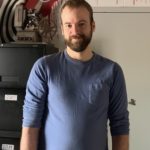 Theo Harrison
Theo Harrison
Theo Harrison is the Film Traffic Coordinator at The Museum of Modern Art’s Celeste Bartos Film Preservation Center, where he handles incoming & outgoing shipments, accessions new items, and prepares material for internal access requests. Theo is a 2016 graduate of the L. Jeffrey Selznick School of Film Preservation and received his BFA from NYU’s Tisch School of the Arts in 2013.
 Ben Harry
Ben Harry
Ben Harry is the Curator of Audiovisual Materials and Media Arts History, L. Tom Perry Special Collections at Brigham Young University. He earned a master’s degree in Moving Image Archive Studies from UCLA in 2006. Ben has worked previously for the National Baseball Hall of Fame and Museum, the Library of Congress, and the Church History Library of the Church of Jesus Christ of Latter-day Saints. His research interests include archival maintenance of audiovisual materials, digitization and access to archival materials, and historical records and research of radio, television, and the cinema.
Genevieve Havemeyer-King
Genevieve Havemeyer-King is the Media Preservation Coordinator for the New York Public Library’s Audio and Moving Image Preservation Unit. She also moonlights as a projectionist and has been a Co-Chair of the AMIA Projection and Technical Presentation Committee since 2017.
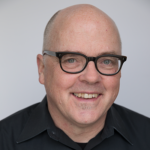 Buzz Hays
Buzz Hays
Buzz Hays is the Global Lead for Media Industry Solutions at Google Cloud. He comes from a production background of over twenty years in film and television, and he works with major media archives around the world to better understand cloud-based solutions for media of all kinds.
Heidi Holmstrom
Heidi Holmstrom has been a Motion Picture Preservation Specialist at the National Archives and Records Administration since 2009. She earned an M.A. in History, with a concentration in Archives and Records Management, from Western Washington University in Bellingham, WA.
 Courtney Holschuh
Courtney Holschuh
Courtney Holschuh is a film inspector at The Museum of Modern Art Celeste Bartos Film Preservation Center where her responsibilities include preparing external access requests, inspecting film loans, and all things nitrate. She holds a Masters in Library Science from Indiana University.
 Jim Hone
Jim Hone
Jim Hone is the Film & Media Digital Archivist for the Washington University Film & Media Archive, where he has managed all film and video related digital initiatives since 2008, including the creation and preservation of digital assets. Jim has been involved in media production for more than 40 years, starting at the CBS Television Network in New York in 1976. He turned to archival work full-time in 2007, when he began arranging, cataloging and digitally reformatting analog media for the Missouri Historical Society’s Richard A. Gephardt Papers Project. Jim holds a B.A. in Government from Manhattan College as well as an M.Div. from Boston College.
 Libby Savage Hopfauf
Libby Savage Hopfauf
Libby Savage Hopfauf is the Program Manager/Audiovisual Archivist at Moving Image Preservation of Puget Sound (MIPoPS) and Project Audiovisual Archivist at Seattle Municipal Archives (SMA) in Seattle, Washington. She received a Master’s in Library and Information Science from the University of Washington and a Bachelor of the Arts in Creative Writing with a minor in Sociology from Western Washington University. She is passionate about creating resources that provide intuitive use of open-source tools, making the digitizing process accessible to archivists (with a wide variety of skill-levels) to ensure the sustainability of institutions to preserve their videotape and conquer the magnetic media crisis.
 Jackie Jay
Jackie Jay
Jackie Jay is an adjunct professor at Diablo Valley College in Pleasant Hill, CA where she helped develop and teaches a course called Digital Assets: Tools and Methodologies in which community college students learn care and handling of archival materials, best practices for scanning with a variety of flatbed scanners and software (both proprietary and open-source), visit a digitization center and an archive, apply metadata basics, upload assets into a cloud-based DAM and QC their digital assets. Jackie also serves as Technical Advisor and Video Preservation Instructor for the American Archive of Public Broadcasting’s Preservation Fellowship.
Primarily she is an archivist working with Beach Blanket Babylon, an iconic campy musical theatre company in San Francisco with the largest hat in the world ever worn on stage, as they prepare to close after forty-five years. Two of her DVC students are interning with her this semester, getting hands on experience assessing and digitizing photo and audiovisual materials. In her spare time she processes a collection for the Internet Archive and digitizes programs for the San Francisco Opera Archives.
 Jennifer L. Jenkins
Jennifer L. Jenkins
Jennifer Jenkins (MLIS, PhD) is Professor in the Southwest Center and English at the University of Arizona. Her work investigates the intersections of film, literature, and archival studies, with special emphasis on nontheatrical film of the Southwestern US and northern Mexico.
Martin L. Johnson
Martin L. Johnson is an assistant professor of English and Comparative Literature at the University of North Carolina at Chapel Hill. His first book, Main Street Movies: The History of Local Film in the United States, was published by Indiana University Press in 2018. He is currently at work on a history of the emergence of the advertising film in the United States.
 Blanche Joslin
Blanche Joslin
Blanche Joslin is the MIAP Technician for the Moving Image Archiving and Preservation Master of Arts at New York University. She recently completed a Master of Arts in Film + Photography Preservation and Collections Management at Ryerson University. She volunteers at the Lesbian Herstory Archive in New York City and as the AMIA Education Committee Student Liaison.
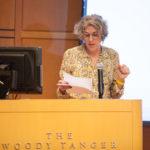 Alexandra Juhasz
Alexandra Juhasz
Alexandra Juhasz has been making and thinking about AIDS activist video since the mid-80s. She is the author of AIDS TV: Identity, Community and Alternative Video (Duke, 1995), and a large number of AIDS educational videos including Living with AIDS: Women and AIDS (1987), Safer and Sexier: A College Student’s Guide to Safer Sex (1991), and Video Remains (2005). Most recently she’s been engaging in online cross-generational dialogue with AIDS activists and scholars about the recent spate of AIDS imagery after a lengthy period of representational quiet. “AIDS Reruns: Becoming ‘Normal’? A Conversation on ‘The Normal Heart’ and the Media Ecology of HIV/AIDS,” with Ted Kerr, Indiewire, August 18, 2014 and “Home Video Returns: Media Ecologies of the Past of HIV/AIDS,” Cineaste (May 2014).
She is a Professor of Media Studies at Brooklyn College and is currently co-curating, with Jean Carlomusto and Hugh Ryan, Visual AIDS 2016 art show, EVERYDAY, and Day With(out) Art video program: Compulsive AIDS Video. As a videomaker, she has made a large number of AIDS educational videos including Living with AIDS: Women and AIDS (1987), Safer and Sexier: A College Student’s Guide to Safer Sex (1991), and most recently, Video Remains (2005).
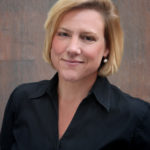 Andrea Kalas
Andrea Kalas
Andrea Kalas is SVP of Asset Management at Paramount Pictures and has worked at the British Film Institute, Discovery Communications, DreamWorks and the UCLA Film and Television Archive. She is interested in moving image preservation from the earliest days of cinema to the present. She has been AMIA President twice and is a member of the Academy of Motion Picture Arts and Sciences.
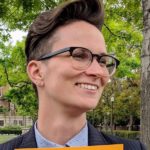 Anne Kelly
Anne Kelly
Anne Kelly is a researcher at the USC Shoah Foundation Dimensions in Testimony program. A graduate with her master’s degree in cinema and media studies from USC, Anne has been published in Cine-Files, The Film Experience and Spectator Magazine. Anne previously worked in film sound restoration for Deluxe Entertainment and consulted at the Academy of Motion Picture Arts and Sciences Oral History Projects.
 Paul Klamer
Paul Klamer
Paul Klamer is the Video Lab Supervisor – NAVCC. From 1993-2004 he was the Senior Systems Engineer at Warner Bros Motion Picture Imaging. While there he represented the studio on several committees. One of these committees was the Digital Cinema Initiative (DCI) which fundamentally changed the way we watch movies for the first time in a century. Paul is the inventor on twenty patents covering digital restoration, data compression, theater systems and projection, He was chief engineer at Paramount Pictures where he supervised maintenance and construction of 14 edit bays, equipment rentals, 5 screening rooms, video duplication, and production of the television shows, “Dr. Phil” and the “The Doctors”
 Chris Lacinak
Chris Lacinak
Chris Lacinak is the founder and president of AVP, a consulting and software company focused on helping organizations maximize the usability of data. AVP clients include the Library of Congress, Smithsonian, HBO, Paramount Pictures, Yale University, and Indiana University. AVP products include embARC, Fixity, Exactly, and Aviary.
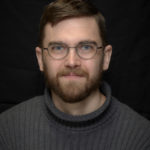 Sam Lane
Sam Lane
Sam Lane is is a native of New Mexico. He moved to Rochester, New York in 2014 and completed a BA in Film and Media Studies and a MA in English, both at the University of Rochester. He is also a graduate of the L. Jeffrey Selznick School of Film Preservation from the class of 2017. Sam worked as a film projectionist in New Mexico from 2006-2009 and at the Dryden Theatre in Rochester, NY since 2016. He began working at the George Eastman Museum as Film Conservation Specialist in 2017.
Kirsten Larvick
Kirsten Larvick is the Founder and Executive Director of the Al Larvick Fund. With its board and committee, she supports the conservation and accessibility of analog home movie, amateur cinema and community recording collections through small grant making and exhibition. Kirsten also co-chairs the Women’s Film Preservation Fund’s Steering Committee and serves on its Awards Selection Panel. Independently, Kirsten works with filmmakers to reach their ongoing archiving and preservation goals and advocates for underrepresented makers’ work to be included in the broader cinema record.
 Gerry Lawson
Gerry Lawson
Gerry Lawson is a member of the Heiltsuk First Nation, and he manages the Oral History and Language Lab at the UBC Museum of Anthropology. With over 15 years in the field of Information Management and Heritage Digitization, he works to develop practical, scalable resources for Indigenous cultural heritage preservation, and to decolonize information practices. Gerry acts as the Technology Lead for the innovative UBC Indigitization Program and works with several groups to advocate for both Indigenous language revival and digital preservation.
 Andrea Leigh
Andrea Leigh
Andrea Leigh is the Moving Image Processing Unit Head at the Library of Congress National Audio Visual Conservation Center where she is responsible for implementing and devising workflows and procedures for the description of moving image resources. Previously, she held positions at the UCLA Film & Television Archive, UCLA Library Cataloging and Metadata Center, Walt Disney Company, Cal State University, Northridge and Creative Artists Agency. She has a B.A. in Theater Arts and MLIS from UCLA.
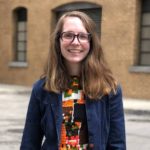 Trisha Lendo
Trisha Lendo
Trisha Lendo is a Senior Media Archivist at Paramount Pictures where she enjoys working with their vast collection including the RKO and Republic catalog. She is a 2010 graduate of the UCLA Moving Image Archive Program and also worked at the UCLA Film & Television Archive after she graduated. Trisha is an active volunteer in Home Movie Day, Mayme A. Clayton Library and Museum, and the Southern California Library. In 2017, Trisha was happy to join the Motion Picture Editor’s guild. This is Trisha’s 5th AMIA conference and she is always happy to find and share orphaned material, leader ladies, or cute dog clips that she finds in the collections she works with.
 Chris Lewis
Chris Lewis
Chris Lewis has been the Media Librarian at American University in Washington, DC since 1992, following stints as a Media Specialist at Indiana University, video artist/producer, and advertising copywriter. His responsibilities include collection development and management of the visual media collections as well as research support and outreach to students and faculty. He is also a coordinator for the AU institutional repository and the library liaison for copyright matters related to scholarship.
 Jim Lindner
Jim Lindner
Jim Lindner is an internationally respected authority on the preservation and migration of electronic media. Jim pioneered many of the techniques now commonly used for videotape restoration and migration to file workflows. He has lectured widely on and written about media preservation for the past twenty-five years and has served on a variety of international media-associated boards and organizations for many years. While Jim’s first awards were as a filmmaker, he went on to receive many awards, first for his pioneering work in computer animation and later for his work in media preservation.
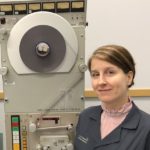 Diana Little
Diana Little
Diana Little has served as Head of Film Preservation at The MediaPreserve, since 2010. She develops preservation plans, selects and maintains equipment, and oversees all preparation of materials, archival scanning, post-production, and quality control for the audiovisual laboratory’s film department. She previously held the position of Senior Preservation Specialist at Cineric, Inc. where she coordinated analog and digital restorations of experimental films and narrative features.
Diana has helped to preserve media collections found in museums, university libraries, historical societies, Hollywood studios, private collections, and corporate archives, and she takes pleasure in knowing that her work contributes to greater access to the cultural heritage found in these institutions.
Diana consults for the NYWiFT Women’s Film Preservation Fund and is a veteran Home Movie Day host. She is a graduate of the L. Jeffrey Selznick School of Film Preservation at George Eastman Museum and holds a B.A. from Vassar College.
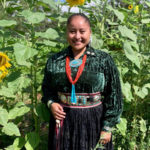 Crystal Littleben
Crystal Littleben
My name is Crystal Littleben and I am of the Red House People Clan, born for the Coyote Pass Clan. My maternal grandfather is of the Deer Springs Clan and parental grandfather is of the From Under His Cover People Clan. I was born in Tuba City, Arizona twenty-seven years ago and was raised in Round Rock, Arizona. I currently work as the Program Coordinator for the Navajo Cultural Arts Program at the Diné College in Tsaile, AZ. I am a graduate of Northern Arizona University with a Bachelor of Arts degree in Psychology and minor in Native American Studies. Also, I am the former Miss Navajo Nation 2017-2018. In addition, I am a full-time student under the Bachelor of Fine Arts program in Navajo Silversmithing here at Diné College. As a silversmith, educator and student, I believe firmly in the cultural arts and stories of Navajo people as catalyst for positive social and cultural enrichment.
 Hugo Ljungbäck
Hugo Ljungbäck
Hugo Ljungbäck is a video artist, film curator, and media scholar whose research focuses on the intersection of video art, media archaeology, and surveillance. His videos have screened at national and international film festivals and galleries. He is an Undergraduate Research Fellow at the University of Wisconsin-Milwaukee and Director and Chief Curator of the UWM Film Studies Archive.
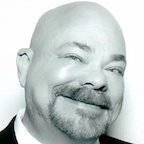 Randal Luckow
Randal Luckow
Randal Luckow is the Director of HBO Archives and holds a BFA in Film and Video Production from UW-Milwaukee, and a MLIS from UW-Madison with a specialization in Archive Administration, from UW-Madison. Previously, Randal was a Managing Archivist at DreamWorks SKG, the Digital Archivist at Turner Broadcasting Inc., and Sr. Director of Metadata Services at Turner Broadcasting.
 Jenni Matz
Jenni Matz
Jenni Matz is the Director of the Television Academy Foundation’s Interviews: An Oral History of Television. With her guidance, The Interviews launched its award-winning website, TelevisionAcademy.com/Interviews which contains cross-referenced access to 900 interviews with television pioneers. Jenni managed the entire digitization project of more than 4,000 hours of video that spanned the Archive’s 20+ year history, working with colleagues in the archival and information technology fields. As its Director, Jenni continued to oversee the online presence of The Interviews and seek ways to enhance use and access of the oral histories, including licensing footage. Jenni began producing and conducting interviews in 2007, and was promoted to Director in 2017.
Prior to arriving at the Academy Foundation, Jenni was the archivist and producer of the American Comedy Archives, a collection of long-form interviews with comedians, spearheaded by comedy legend Bill Dana. She has worked for more than 15 years in documentary television production as a producer, editor, and researcher, including work on the award-winning PBS special Hoover Dam and a 16-part series on American Literature for Annenberg CPB. She is an award-winning documentary filmmaker, having toured the festival circuit with her rock-documentary about the New Jersey band Rye Coalition. She is also Vice-Chair of the Motion Picture Academy’s oral history collective, MIC’D (Moving Image Craft Documentation). Jenni is a graduate of Bates College with a degree in Philosophy and holds a Master’s in Library and Information Sciences from Simmons College, as well as a J.D. from Southwestern Law School.
 Amanda Koss May
Amanda Koss May
Amanda Koss May is a Digital Conversion Specialist in the Preservation Reformatting Division of the Library of Congress, where she extracts and preserves data from obsolete data storage media. She holds an MLS in Archives, Records and Information Management from the University of Maryland and is a Certified Archivist. She is involved with the Mid-Atlantic Regional Archives Conference and leads a born-digital collections discussion group for D.C.-area archivists.
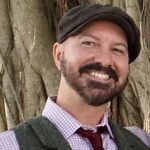 Brent McCullough-Phillips
Brent McCullough-Phillips
Brent McCullough-Phillips is the Audiovisual Archivist at the Rockefeller Archive Center in Sleepy Hollow, New York, where he preserves film, video, and audio material attendant to the history of the Rockefeller family, their organizations, and other philanthropic institutions such as the Ford Foundation, Asia Society, and the Near East Foundation. He is a 2003 graduate of the L. Jeffrey Selznick School of Film Preservation at the George Eastman Museum. From 2003-2016, Brent worked as the Media Specialist for the Fales Library & Special Collections/New York University. His book “Charles Walters: The Director Who Made Hollywood Dance” was published by University Press of Kentucky in 2014, and Phillips programmed and co-hosted a four-night, thirty film retrospective of Walters’s work for the Turner Classic Movies cable channel. Brent is also an advocate for the preservation of the Irish language.
Chloe McLaren
Chloe McLaren is a Metadata Librarian at Cornell University, where she works with their AV streaming platform and is engaged with digitization workflows (along with lots of other unrelated things). Previously, she was the Technical Manager at the University of Chicago Film Studies Center, where she worked with their film collection and its users. She is currently a co-chair of AMIA’s Cataloging and Metadata Committee.
Megan McShea
Megan McShea is the Audiovisual Archivist at the Archives of American Art, Smithsonian Institution. She teaches the workshop “Arrangement and Description of Audiovisual Materials” for the Society of American Archivists, and authored “Guidelines for Processing Collections with Audiovisual Material” for AAA and anyone else who might find it useful. She received her MLS from the University of Maryland, College Park.
 Brian Meacham
Brian Meacham
Brian Meacham is the Archive and Special Collections Manager at the Yale Film Study Center, where he oversees acquisition, inspection, cataloging, and preservation of the Yale Film Archive, which includes print and pre-print elements acquired by the university over the last 50 years. He has overseen the preservation of more than a dozen films in the collection, and helped launch and program the archive’s ongoing 35mm screening series, “Treasures from the Yale Film Archive.” He represents Associate archives on FIAF’s Executive Committee and serves on FIAF’s Programming and Access to Collections Commission.
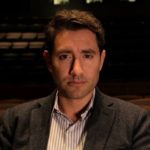 Ross Melnick
Ross Melnick
Ross Melnick is associate professor of Film and Media Studies at University of California, Santa Barbara. He is the author of American Showman, the co-editor of Rediscovering U.S. Newsfilm: Cinema, Television and the Archive, and was named an Academy Film Scholar in 2017 for his forthcoming book on Hollywood’s global exhibition operations. He is currently Chair of the Media Archives Committee for the Society of Cinema and Media Studies and chair of the UCSB Film and Media Studies Archive Committee.
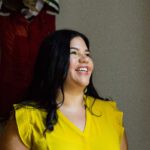 Ashley Minner
Ashley Minner
Ashley Minner is a community based visual artist from Baltimore, Maryland. An enrolled member of the Lumbee Tribe of North Carolina, she has been active in the Baltimore Lumbee community for many years, and regularly visits communities throughout the U.S South and Latin America as well. Ashley is a professor of the practice and folklorist in the Department of American Studies at University of Maryland Baltimore County, where she also serves as the inaugural director of the minor in Public Humanities. Ashley is a doctoral candidate in the Department of American Studies at University of Maryland College Park, where she is completing her dissertation on the changing relationship between Baltimore’s Lumbee community and the neighborhood where they first settled.
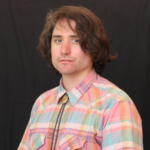 Morgan Oscar Morel
Morgan Oscar Morel
Morgan is BAVC’s Preservation Manager. He received a Masters of Science in Information for the University of Michigan’s Information School. Morgan is interested in finding the best ways to preserve and provide access to the history and cultural heritage held on tape media, whether by collaborating on open source projects or by opening up decks and seeing what goes on inside. At BAVC Morgan manages the Preservation Department, supervises analog to digital transfers, and engages with community members and partners to preserve at-risk media.
 Jan Müller
Jan Müller
Jan Müller is the Chief Executive Officer (CEO) of the National Film and Sound Archive of Australia (NFSA). Mr Müller is also a Member of the Advisory Board of the Centre for Media History at Macquarie University, Sydney. Mr. Müller is a highly experienced CEO and leader in the digital heritage and culture sector internationally. From 2009-2017, he was CEO of the Netherlands Institute for Sound and Vision, which comprises one of the largest audiovisual collections in Europe.
Prior to turning to the cultural sector, Mr Müller spent more than 20 years working in the advertising industry, including a stint as CEO of Saatchi & Saatchi in Amsterdam, and as a member of the board of the agency in Europe. He was Chair of the Europeana Foundation, an online collection of over 50 million digitized items from museums, libraries, archives and collections. Mr Müller was also President of the International Federation of Television Archives (2012-2016), and Chair of the Dutch Media Literacy program and the Dutch National Coalition for Digital Preservation and Sustainability.
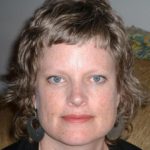 Kate Murray
Kate Murray
Kate Murray is the Digital Projects Coordinator in the Digital Collections Management and Services at the Library of Congress where she leads the Federal Agencies Digital Guidelines Initiative (FADGI) Audio-Visual Working Group and the Sustainability of Digital Formats website. Prior to joining the Library of Congress, Kate was the Digitization Process Development Specialist at the National Archives and Records Administration specializing in standardizing and documenting moving image and audio formats. Previous affiliations include the University of Maryland Libraries, Emory University Libraries, University of Cape Town Libraries and NYU Libraries. Kate is a member of AMIA (Preservation Committee co-chair 2010-2013), IASA (Technical Committee member), SMPTE, ISO/TC171/SC2 (PDF standards committees) and ISO/IEC JTC 1/SC 34/JWG 7 (EPUB standards committee). She was the co-chair of the Mellon Foundation/Digital Preservation Coalition’s Task Force on Technical Approaches to Email Archiving, co-coordinator of the 2015 Archiving Email Symposium, co-coordinator of the 2017 Architecture, Design and Engineering Asset Summit Symposium and co-coordinator of Born to Be 3D in 2018. In 2019, she received one of the inaugural JTS Awards for contributions to the technology of the audiovisual archiving field. Kate received her undergraduate degree in Medieval Literature from Columbia University and her MBIBL from the University of Cape Town.
 Rich Newberg
Rich Newberg
Rich Newberg retired as an anchor, senior correspondent, and documentarian from WIVB-TV in 2015. During his 37 years at the station, he created New York Emmy award-winning documentaries which are available online through the Buffalo & Erie County Public Library (B&ECPL). He has written articles on the local television news archive for the National Television Academy, of which he serves as a regional vice president.
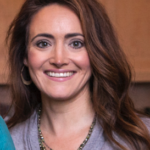 Jennifer O’Neal
Jennifer O’Neal
Jennifer O’Neal is an Assistant Professor in Ethnic Studies at the University of Oregon, and affiliated faculty with the History department and Robert D. Clark Honors College. Her research and teaching are dedicated to centering indigenous traditional knowledge, decolonizing methodologies, applying indigenous research methods, and implementing place-based education. She has led the development and implementation of best practices, frameworks, and protocols for Native American archives in non-tribal repositories in the United States. She serves as a member of the Indigenous Archive Collective and is a member of The Confederated Tribes of Grand Ronde in Oregon (USA).
 Johan Oomen
Johan Oomen
Johan Oomen is head of Research and Heritage Services at the Netherlands Institute for Sound and Vision and researcher at the User-Centric Data Science group of the VU University Amsterdam. He and his group are working on research projects that focus on digital heritage in all its facets. He has worked for the British Universities Film and Video Council and commercial broadcaster RTL Netherlands. He is a board member of the Europeana Association, the EUscreen Foundation, and the PublicSpaces Foundation. He is also an advisor to the Amsterdam Fund for the Arts and the Dutch National Research Council for Cultural Heritage, and is co-chair of the Dutch Digital Heritage Network (NDE).
 Devin Orgeron
Devin Orgeron
Devin Orgeron is Editor of The Moving Image, Professor Emeritus of Film and Media Studies at North Carolina State University, and Chair of the Northeast Historic Film Summer Symposium, which takes place in late July in Bucksport, Maine.
 Rich Pyszczek
Rich Pyszczek
Rich Pyszczek is the President of the Niagara Frontier Council for the Social Studies (NFCSS), and also serves as Coordinator of Social Studies for the Buffalo Public Schools. Mr. Pyszczek oversees efforts to provide leadership, service, and support for all Social Studies educators in the eight counties of Western New York. Under his leadership, his Council has forged solid new partnerships with Buffalo area museums, libraries, colleges and universities, and cultural institutions. In partnering with the Buffalo Broadcasters Association and retired TV newsman Rich Newberg, Mr. Pyszczek has facilitated the creation of new black history public school curricula based on documentary segments aired on WIVB-TV, the CBS affiliate in Buffalo. Mr. Pysczczek will discuss the implementation and impact of “The Black History Project: A Moving Image History for the Classroom.”
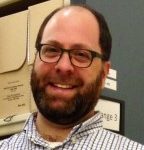
Michael Pahn
Michael Pahn
Michael Pahn is the Head of Archives and Collections Digitization at the Smithsonian Institution’s National Museum of the American Indian Archive Center, located in the museum’s Cultural Resources Center in Suitland, Maryland. Michael began at NMAI in 2003 as Media Archivist and has overseen preservation projects funded by the National Film Preservation Foundation, Save America’s Treasures, and the Smithsonian Collections care and Preservation Fund. He has been NMAI’s Head Archivist since 2014, during which time he has overseen major improvements to online access to NMAI’s archival collections. Michael is Vice Chair of the Smithsonian Music Executive Committee and is a past member of the Society of American Archivists’ Native American Archives Section Steering Committee. He has a BA in Anthropology from the University of Pittsburgh and an MLS from the University of Maryland. His prior professional experiences include Save Our Sounds Project Librarian at the Smithsonian Center for Folklife and Cultural Heritage, and Librarian at The Nature Conservancy.
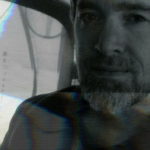 Mark Quigley
Mark Quigley
Mark Quigley is the John H. Mitchell Television Archivist for the UCLA Film & Television Archive. He previously served as an access and research archivist at UCLA for 17 years. Work includes programming the exhibitions, “Rod Serling: Other Dimensions” (2012) and “Golden Age of Television Writers on the Big Screen” (2017); organizing symposia including “This is the City: Preserving Moving Images of Los Angeles” (2015); grant writing and co-developing online access portals for the KTLA Newsfilm collection, the U.S. Steel Hour and In The Life series and managing 2” videotape preservation projects. Publications include “Hallmark Hall of Fame: The First 50 Years.” He holds an M.F.A. from UCLA’s School of Theater, Film, and Digital Media.
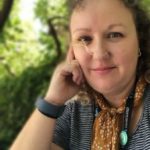 Meredith Reese
Meredith Reese
Meredith Reese is the Digital Asset Manager for the Los Angeles Philharmonic. She oversees the rollout of the LA Phil’s digital asset management system, Clark, and projects related to improving digital workflows, file management, and metadata best practices. She sits in the Archives department, responsible for preserving the LA Phil’s historical records and curating exhibits within the concert hall and the Hollywood Bowl Museum. In the past, she consulted on successful digital asset management strategies for Walt Disney Studios, and Mattel, and was Manager of Archives, Metadata and Asset Management at HBO. Meredith holds a MA degree from UCLA with a specialization in Moving Image Archives Studies. She serves on the Editorial Board for AMIA’s the Moving Image.
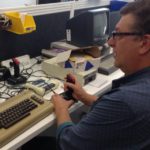 Nick Richardson
Nick Richardson
Nick Richardson has worked in film archives for over 25 years. He previously worked at the Film Archives of the Australian Institute of Aboriginal and Torres Strait Islander Studies (AIATSIS) in Canberra, where he worked on preserving and cataloguing 30,000 items for the Filmography of Indigenous Australia. He was also the Last Film Search Officer at Australia’s National Film and Sound Archive, leading up the search for nitrate material.
At ACMI, Nick manages a collection of 250,000 moving image items ranging from 16mm film prints dating back to the early 1900s to the latest in digital and VR art pieces. He has a particular focus on enabling public access to these items. He is currently working on a project of digitisation of rare and fragile film and magnetic media, and will be a chief investigator in a preservation project on video games of the 1990s.
Luis Rosario-Albert
Luis Rosario-Albert holds a B.A. in Humanities from the University of Puerto Rico, Río Piedras Campus and a M.A. in Cinema Studies from New York University. In 2012, he completed his doctoral degree in Communication at the University of Navarra, Pamplona, Spain. In Puerto Rico, Dr. Rosario-Albert has contributed to the organization and development of audiovisual archives at the Luis Munoz Marin Foundation, the Puerto Rico General Archive and the Puerto Rico Corporation for Public Broadcasting. He has published books and research articles in academic journals and chapters in books on topics such as Media Economics, Public Media and Telecomunications Policies in Puerto Rico, and more recently on European Public Service Broadcasters’ International Television Services. In 2017, Dr. Rosario-Albert was appointed to the Board of Directors of the Latino Public Radio Consortium and in 2018 was selected to participate at the Annenberg-Oxford Media Policies Institute at the University of Oxford. Since 2014 he works as an as Assistant Professor at the Department of Communication at the Ana G. Méndez University, Gurabo Campus.
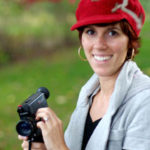 Elena Rossi-Snook
Elena Rossi-Snook
Elena Rossi-Snook is the Collection Manager for The New York Public Library’s Reserve Film and Video Collection. She has served as a curriculum consultant for the NYU Moving Image Archiving and Preservation MA program, on the Board of Directors of the Association of Moving Image Archivists and is the chair of the AMIA Film Advocacy Task Force. Rossi-Snook also teaches film history at Pratt Institute in Brooklyn, N.Y. She has an M.A. in Film Archiving from the University of East Anglia.
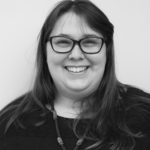 Rebecca Ruud
Rebecca Ruud
Rebecca Ruud is a Media Archivist at Paramount Studios. She is a graduate from UCLA’s MLIS program. Becky Ruud has been working in Paramount’s Archive since 2015, managing the company’s digital stills.
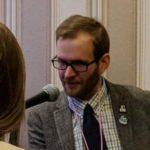 Phil Salvador
Phil Salvador
Phil Salvador is the Visual Media Collections Coordinator at the American University Library, where he handles the library’s project to digitize and preserve its VHS collection. Phil loves ephemeral media, and he writes about video game preservation and history on his blog. He is a friend to all birds.
 Crystal Sanchez
Crystal Sanchez
Crystal Sanchez is a media archivist in an IT world at the Smithsonian Institution, working on the Digital Asset Management System to preserve and provide access to digital collections from across the Smithsonian’s 19 Museums, Archives, Libraries, Research Centers, and the Zoo. She has Master’s degrees from NYU’s Moving Image Archive and Preservation Program and FSU’s Interdisciplinary Humanities with a focus on Media and Museum Studies. She is currently Chair of AIC’s Electronic Media Specialty Group. She loves to stroll through fine art museums and to cook. she/her
 Stephanie Sapienza
Stephanie Sapienza
Stephanie Sapienza is a Digital Humanities Archivist at the Maryland Institute for Technology in the Humanities (MITH) at the University of Maryland, where she develops, coordinates and implements digital research projects which foster collaborations between MITH and other library, archival, or cultural heritage organizations. This includes an Affiliate Librarian appointment working directly with UMD Libraries’ Digital Systems and Stewardship division on special projects, as well as with other UMD departments and outside institutions on developing new projects and partnerships. In the past, Stephanie was the Project Manager for the American Archive of Public Broadcasting at the Corporation for Public Broadcasting, where she managed strategic operational planning for metadata and digitization initiatives. Before moving to DC in 2010, she was the Project Director on a Getty-funded grant for Los Angeles Filmforum entitled Alternative Projections: Experimental Film in LA 1945 -1980, a historical survey and preservation project resulting in over 35 new oral histories, an academic symposium, a media-rich website and database, and a 16+ screening exhibition series. She also served as Managing Director of iotaCenter, a small nonprofit film archive of experimental film and abstract animation. Before graduate school, Stephanie worked for six years as a researcher and producer on documentaries and television shows, and specialized in finding and licensing archival footage and photos for use in productions. She has a bachelor’s degree in Film Studies and English from the University of Kansas, and a master’s degree in Moving Image Archive Studies from UCLA.
 Aaron Saubel
Aaron Saubel
Aaron Saubel is a tribal member from the Los Coyotes Tribe of Cahuilla and Cupeno Indians in Warners Hot Springs. For the past three years Aaron has served his community as a council member for his tribe. He also serves all Cahuilla communities by keeping traditional ceremonial songs alive. Aaron Saubel is a volunteer at Malki Museum. He works to give special tours for the museum’s botanical garden. He also instructs various courses throughout the year that are offered at Malki Museum, as well as, through Morongo Cultural Heritage Department. He instructs classes that teach the community about Cahuilla culture, music, and native plants. His knowledge of plants comes from growing up learning from his grandmother Katherine Saubel.
 Angela Saward
Angela Saward
Wellcome Collection is a museum and library which has a collection of multi-media works (prints, drawings, books, archives, paintings and audio-visual materials) covering the history of medicine and what it is to be human. I work within the Research Development team in Collections & Research. Our team looks at engaging the research community (a researcher in the broadest sense) and activating research into with our unique and distinctive collections. I am the programme lead for the Collections Research Support strand of activity working with internal stakeholders such as the Exhibitions and Policy teams. My collections specialism is moving image and sound: Wellcome has a collection of film, video and audio from throughout the twentieth century.
 Teague Schneiter
Teague Schneiter
Teague Schneiter is the Sr. Manager and founder of the Academy of Motion Picture Arts and Sciences’ Oral History Projects department and Visual History Program. She came to the Academy in 2012 with over 10 years of moving image research, curatorial, and audiovisual collection management experience, working with oral history and other cultural heritage materials in Australia, the Netherlands, and North America; for human rights organization WITNESS and indigenous media organization Isuma.TV. Since founding the Oral History department at the Academy, under her leadership over 220 interviews have been recorded in 13 languages and 9 countries; and over 1,500 legacy interviews have been collected. , and the Academy launched its first multilingual website. Since 2016, Teague has served on the Board for AMIA, working on initiatives related to making a more welcoming conference, continuing education, advocacy and equity. She is the author of a forthcoming report commissioned by the National Film Preservation Board on cultural equity and inclusion in the field of audiovisual archiving. Teague is the founder of best practices alliance with the Guilds called the MIC’D Alliance, co-founder of AMIA’s Advocacy Committee of the Board, the Continuing Education Advisory Task Force, the Oral History Committee, and is active in OHA, IASA and SAA. Teague is a graduate of the University of Amsterdam’s MA in Preservation & Presentation of the Moving Image.
 Ariel Schudson
Ariel Schudson
Ariel Schudson is an LA native and Archival Activist. She has maintained a strong presence in the AV Archives community for almost 10 years and is a respected figure in the AMIA community. As the creator of Archivist’s Alley, an intersectionally-centered podcast based on diverse voices, issues of structural oppression and lesser known media materials, Ariel has made it her goal to platform the multiplicity of stories that the archives/preservation has to offer. We cannot afford anything but inclusion, respect and kindness in this field. As of December 2019, Ariel will be living in Paju, South Korea with her two cats, Wallach and Eartha, working on her book, teaching kids, and trying to eat all the kimchi.
Annie Schweikert
Annie Schweikert is a Project Assistant at the Berkeley Art Museum & Pacific Film Archive, and a Lab Assistant at the Stanford Media Preservation Lab and Born-Digital/Forensics Lab.
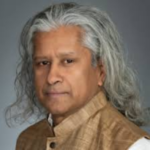 Guha Shankar
Guha Shankar
Guha Shankar, is Folklife Specialist at the American Folklife Center, Library of Congress. He is involved in a range of public outreach programs, including serving as coordinator of Ancestral Voices, a collaborative digital knowledge repatriation initiative with indigenous communities and open source platforms, Local Contexts and Mukurtu CMS. He is Director of the Civil Rights History Project, a national oral history collecting initiative of the Library and the Smithsonian’s NMAAHC. Drawing on his background in ethnographic film production, audio recording, photography and archiving, Shankar conducts workshops in field documentation methods and skills training with a range of communities and institutions. He has a PhD in Anthropology from the University of Texas at Austin (2003) with a concentration in Folklore and Public Culture and a B.A. in Media Production and Political Science from UNC Chapel Hill (1982).
 Nadja Šičarov
Nadja Šičarov
Nadja Šičarov is a film conservator-restorer at the Austrian Film Museum. After finishing her undergraduate studies in Conservation and Restoration of Fine Arts at the Academy of Fine Arts, University of Ljubljana, she finished her MA in Preservation and Presentation of the Moving Image at the University of Amsterdam. Between 2016 and 2019 she worked at Slovenska kinoteka in Ljubljana as a conservator-restorer of film collections and conducted an internship at the Yugoslav Film Archive in Belgrade. She has initiated Kinoteka’s project Stories from the Cabinet, which aims at the recovery and research of home movies. Šičarov is a co-coordinator of an international project Share That Knowledge: Finding Strategies for Passing on Knowledge Across Generations of Archivists, a researcher within a project Database of Slovene films and a member of the programme team at the FEKK festival in Ljubljana.
 Steven Sielaff
Steven Sielaff
Steven Sielaff is Senior Editor & Collections Manager at the Baylor University Institute for Oral History in Waco, TX. A graduate of Baylor’s Museum Studies master’s program, he began at the Institute as a graduate assistant working on various web-based and multimedia projects, including For the Greater Good: Philanthropy in Waco, the Texas Holocaust and Genocide Commission’s Texas Liberators Oral History Project, and War Comes to Waco, A WWI digital exhibit. Steven has also conducted many institutional oral histories, including series on both the Dr Pepper Museum and Mayborn Museum Complex, as well as a forty-interview series on the history of Baylor University.
He oversees every technical aspect of processing, preserving, and disseminating Baylor’s oral history collection. He directs the digitization of BUIOH’s analog collection, administers the institute’s website, manages social media news feeds, and spearheads the migration of transcripts and audio files to the institute’s searchable online database powered by ContentDM. He also supervised the installation of the University of Kentucky’s Oral History Metadata Synchronizer (OHMS) software at Baylor. OHMS was most recently featured in the Institute’s Survivors of Genocide online exhibit, winner of the 2018 Oral History Association (OHA) Best Small Project Award.
He is currently president of the board of the Heart of Texas Regional History Fair and is Editor-in-Chief of the Texas Oral History Association’s annual journal, Sound Historian. He also serves as chair of the OHA Metadata Task Force, is a member of the OHA Archives Interest Group, serves as chair of the International Oral History Association’s Website Committee, and is Managing Editor for the H-OralHist listserv.
 Sigríður Regína Sigurþórsdóttir
Sigríður Regína Sigurþórsdóttir
Sigríður Regína Sigurþórsdóttir is an independent moving image archivist and film scholar. She is primarily based in Iceland and her most recent work includes cataloging projects for the National Film Archive of Iceland and grant-funded research regarding the preservation of time based media art at the Reykjavík Art Museum. She graduated with a masters degree from NYU’s Moving Image Archiving and Preservation Program and also holds an MA in Cinema Studies from NYU. Her MIAP thesis explored Icelandic home movies, as well as unpublished and amateur material in the National Film Archive of Iceland. She has trained at Mercer Media, participated in the Audiovisual Preservation Exchange program, and worked on projects for CUNY TV, Fales Library and Special Collections, Harry Ransom Center, the LGBTQ Community Center National History Archive and The Library Freedom Institute. Outside of archiving she works and has worked in various moving image related areas including filmmaking, teaching cinema studies in upper secondary school, writing film criticism and programming for film festivals.
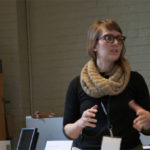 Amy Sloper
Amy Sloper
Amy Sloper is the Collections Archivist at the Harvard Film Archive. She also serves on the board of the Center for Home Movies and has been involved in the Community Archiving Workshop since 2011.
 Robert M. Smith
Robert M. Smith
With over 35 years of experience as a Dangerous Goods and Hazardous Materials consultant, performance packaging designer and DG/Hazmat training facilitator, Robert graduated from Ontario College of Art & Design (OCAD) in Toronto. After a few years of starving as an artist, he pursued the more lucrative side of his education in industrial design. This has morphed from packaging design to hazardous materials transportation and now as CEO of CARGOpak Corp he assists a broad range of clients in HazMat transport training and compliance throughout the United States, Canada and abroad.
In the early 90’s Robert collaborated with the Library of Congress in developing and designing the first UN performance-oriented packaging for shipping nitrate films. He also interfaces on behalf of his clients with various levels of governmental agencies including US-Dept. of Transportation-PHMSA, FAA, CDC, US Coast Guard, Int. Civil Aviation Org. and Transport Canada.
 Kira Sobers
Kira Sobers
Kira Sobers is the Digital Media Coordinator for the Smithsonian Institution Archives where she has worked since 2008. She oversees the digitization workflow of photographs, documents, audio, and video materials from initial cataloging to online access. She recently served as the technical point of contact on two pan-Institutional projects to survey audiovisual collections and conduct a preservation readiness assessment of the almost 300,000 assets identified.
 Dan Streible
Dan Streible
Dan Streible is an associate professor in New York University’s Department of Cinema Studies and associate director of its Moving Image Archiving and Preservation Program. He teaches courses in film history, curating moving images, archival research, and nonfiction media. Since 1999, he has directed the Orphan Film Symposium, which he co-founded at the University of South Carolina and now organizes via NYU Tisch School of the Arts. His books include Fight Pictures: A History of Boxing and Early Cinema and the co-edited Learning with the Lights Off: Educational Film in the United States. He has published articles about amateur film, nontheatrical media, newsreels, filmmaker Helen Hill, and media artist Bill Morrison. As an Academy Film Scholar he is writing a book to be called Orphan Films: Saving, Studying, and Screening Neglected Cinema. He invites you to the 12th Orphan Film Symposium, “Water, Climate, & Migration,” at Eye Filmmuseum in Amsterdam, in May 23-27, 2020.
 Juana Suárez
Juana Suárez
Juana Suárez is the director of the Moving Image Archiving and Preservation Program at New York University. She is a media preservation specialist, and a scholar in Latin American Cinema. Author of Cinembargo Colombia: Critical Essays on Colombian Cinema (2009), published in English (2012) and Spanish (2009), and Sites of Contention: Cultural Production and the Discourse of Violence in Colombia (published in Spanish 2010); and co-editor of Humor in Latin American Cinema (2015). She recently completed the translation to Spanish of A Comparative History of Latin American Cinema by Paul A. Schroeder-Rodríguez, to be published in March 2020. She is currently forwarding a research project tentatively entitled Moving Images Archives, Cultural History and The Digital Turn in Latin America. She is the coordinator of arturita.net, a collaborative digital humanities project on Latin American AV archives.
 Ed Summers
Ed Summers
Ed Summers is a Research Faculty member at the Maryland Institute for Technology in the Humanities (MITH) at the University of Maryland, where he studies and works with the Web as a sociotechnical system, with particular interest in its evolving architecture and practices of curation and preservation. Ed has been working for two decades helping bridge the worlds of libraries and archives with the World Wide Web. During that time Ed has worked in academia, start-ups, corporations and the government. He is interested in the role of open source software, community development and open access to enable digital curation. Ed has a MS in Library and Information Science and a BA in English and American Literature from Rutgers University. He is also a PhD student in the UMD iSchool where he studies web archiving practices. Prior to joining MITH, Ed helped build the Repository Development Center (RDC) at the Library of Congress. In that role he led the design and implementation of the NEH funded National Digital Newspaper Program’s web application, which provides access to 8 million newspapers from across the United States. He also helped create the Twitter archiving application that has archived close to 500 billion tweets (as of September 2014). Ed created LC’s image quality assurance service that has allowed curators to sample and review over 50 million images. He served as a member of the Semantic Web Deployment Group at the W3C where he helped standardize SKOS, which he put to use in implementing the initial version of LC’s Linked Data service.
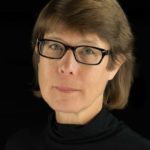 Linda Tadic
Linda Tadic
Linda Tadic is Founder/CEO of Digital Bedrock, a managed digital preservation service that helps libraries, archives, museums, producers, studios, artists, and individuals preserve their digital content. She is also an adjunct professor in UCLA’s Moving Image Archive Studies program teaching two courses: Digital Asset Management, and Media Description and Access. She was previously an adjunct professor in NYU’s Moving Image Archiving and Preservation program. Her over 35 years’ experience includes positions at ARTstor, HBO, the Media Archives and Peabody Awards Collection at the University of Georgia, Pacific Film Archive, and the UCLA Film and Television Archive. Linda consults and lectures on digital asset management, audiovisual and digital preservation, copyright, metadata, and the impact of digital preservation on the environment. She is a founding member and former President of the Association of Moving Image Archivists (AMIA), and is currently on The National Digital Stewardship Alliance (NDSA) Coordinating Committee.
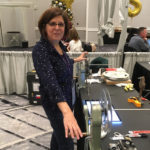 Louisa Trott
Louisa Trott
Louisa Trott is the digital projects librarian at the University of Tennessee, Knoxville. She is a graduate of the University of East Anglia’s film archiving master’s program, and has worked with amateur film collections at regional and national film archives including the Imperial War Museum, London, and Screen Archive South East, Brighton. In 2005, she co-founded the Tennessee Archive of Moving Image and Sound in Knoxville. Ask her about early color processes for amateur filmmakers, but only if you have 3 hours to spare.
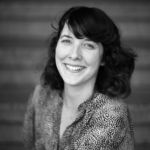 Pamela Vadakan
Pamela Vadakan
Pamela Vadakan directs California Revealed, a California State Library initiative to digitize and preserve archival collections related to California history from partner libraries, archives, museums and historical societies. She’s also a member of the Community Archiving Workshop and serves on the Board for the Center for Home Movies. She has a Master’s degree in Moving Image Archiving and Preservation from New York University.
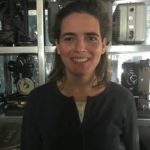 Janneke van Dalen
Janneke van Dalen
Janneke van Dalen is co-head of the film collection at the Austrian Film Museum in Vienna, managing the ongoing preservation and restoration projects. She holds a Master degree in Preservation and Presentation of the Moving Image from the University of Amsterdam and a Bachelor degree in Cultural Studies from the Vrije Universiteit in Amsterdam. Prior to working at the Austrian Film Museum, Janneke interned at the Visual History Archive in South Africa, worked as an audio-visual archivist at the Netherlands Institute for Sound and Vision, as a film projectionist and technician for film festivals, cinemas, and exhibitions, and was actively involved in running Filmhuis Cavia, a volunteer-run independent cinema in Amsterdam. In 2016 Janneke was further trained in film preservation at the Jeffrey L. Selznick School in Rochester, USA, followed by a fellowship at Haghefilm Digitaal. Janneke is one of the initiators and coordinators of the research project Share That Knowledge: Finding Strategies for Passing on Knowledge Across Generations of Archivists.
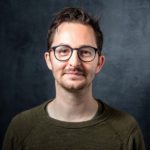 Erwin Verbruggen
Erwin Verbruggen
Erwin Verbruggen is an experienced project lead who has worked on several (inter)national projects in the field of audiovisual preservation and online access. Erwin obtained an MA in Preservation and Presentation of the Moving Image at the University of Amsterdam. He interned at the human rights organization WITNESS in Brooklyn, NY and was a film programmer for the Open Air Film Festival Pluk de Nacht in Amsterdam. He helped set up the Netherlands Institute for Sound and Vision’s film scanning process, and has been a project lead on European collaborative projects, where he co-designed the interactive Na de Bevrijding XL application and became network coordinator for the EUscreen Foundation. Erwin coordinates the annual Winter School for Audiovisual Archiving, was involved in audiovisual archiving toolset development, and develops web archiving best practices for the award-winning Digital City Revives. Erwin is a member of AMIA’s Open Source Committee and the Continuing Education Task Force, co-chair of AMIA’s International Outreach Committee, and elected management board member of the Europeana Network Association.
 Patricia Ledesma Villon
Patricia Ledesma Villon
Patricia Ledesma Villon accessions and digitizes collections for Memories to Light, an Asian American home movie project presented by the Center for Asian American Media (CAAM). Currently, she is a production archival assistant working in home movie collection outreach and processing for “The Asian Americans,” a PBS documentary produced by CAAM, WETA, ITVS, Flash Cuts and Tajima-Peña Productions. Prior to her work with CAAM, Patricia interned at the Philippine Film Archive in Manila, formerly known as the National Film Archive of the Philippines. Born and raised in the San Francisco Bay Area, she is currently based in Oakland and is a member of Black Hole Collective Film Lab, an artist-run motion film lab; is a co-programmer for Light Field, a collectively-run international exhibition of recent and historical experimental film and moving image art on celluloid; and works as an assistant for the filmmaker and writer Trinh T. Minh-ha. She holds a B.A. in media studies from the University of California, Berkeley.
 Pamela Vízner
Pamela Vízner
Pamela Vízner is a media archivist from Chile with international experience in film, video, audio and digital preservation, specializing in collection management and digitization workflows. Pamela began her career in sound archives as an audio engineer and later developed an interest in moving image collections to round out her skills. She holds a BA in Music and Sound Sciences from Universidad de Chile and an MA in Moving Image Archiving and Preservation from NYU. Pamela has participated in NYU’s Audiovisual Preservation Program (APEX) since 2013 and is a passionate member of the international archiving community and is always looking for ways to integrate diverse dialogue for mutual collaboration.
 Eric Wenocur
Eric Wenocur
Eric Wenocur, Owner/Principal of Lab Tech Systems, has been involved with professional audio and video since 1980. Starting in music recording on analog tape, and moving into television facility engineering, he has worked with a vast range of technologies used for the creation, processing and delivery of video and audio. Being familiar with both current and “legacy” equipment, Eric has designed and built archive capture systems for numerous clients, including many Smithsonian museums in the Washington, DC area
 Dony West
Dony West
Dony West is the Executive Director, Digital Archive at Paramount Pictures.Dony studied Photography and Media Studies at the Columbus College of Art and Design, with MFA experience at the Academy of Art San Francisco – School of Photography. Dony has over 18 years of post-production workflow enhancement experience for entertainment studios in Los Angeles. Dony has spent the last 13 years with Paramount, overseeing the complete stills collection (Photochemical/Born Digital) for Paramount Theatrical, Paramount Television, & Paramount Animation.
Alex Whelan
Alex Whelan is the Time Based Media Metadata Librarian at Columbia University, an independent film educator, and 16mm filmmaker. He is a graduate of the Pratt Institute School of Information.
 Mark Williams
Mark Williams
Mark Williams is Associate Professor of Film and Media Studies at Dartmouth College and director of The Media Ecology Project (MEP), which is developing a virtuous cycle of new interdisciplinary scholarship about archival media that adds value back to participating archives. He has published widely on media history and historiography, for example in The Routledge Companion to Media Studies and The Digital Humanities; The Arclight Guidebook to Media History and The Digital Humanities; Télévision: le moment expérimental (1935-1955); Convergence Media History; New Media: Theories and Practices of Digitextuality; Collecting Visible Evidence; No Laughing Matter: Visual Humor in Ideas of Race, Nationality and Ethnicity; and Living Color: Race, Feminism, and Television. He is a co-editor and contributor to Rediscovering U.S. Newsfilm: Cinema, Television, Archive (AFI Series, Routledge, 2018). At Dartmouth he received a Scholarly Innovation and Advancement award to build and develop The Media Ecology Project (MEP). With Michael Casey (Dartmouth Music, Computer Science) he received an NEH Digital Humanities Start-Up Grant to create the ACTION toolset for cinematic analysis. With John Bell (Dartmouth Information Technology) he received an NEH grant to build a Semantic Annotation Tool (SAT). With Lorenzo Torresani (Dartmouth Computer Science) he received a Knight Foundation grant to develop computer vision and machine learning capacities for moving images. In 2019 he received two advancement grants from the NEH to further develop the MEP Semantic Annotation Tool for expansive studies of early silent cinema and civil rights television newsfilm.
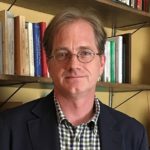 Greg Wilsbacher
Greg Wilsbacher
Greg Wilsbacher is the visual materials archivist at the Alan Mason Chesney Medical Archives of the Johns Hopkins Medical Institutions, where he manages an extensive collection of medical and health-related moving images, photographs and sound recordings. At Johns Hopkins, he also serves as chair of the university-wide Recorded Image and Sound Preservation Committee, coordinating collaborative audiovisual preservation efforts throughout the institution. He is a longtime organizer of Home Movie Day Baltimore and a curator of archival film events that fuse simultaneous projections with live experimental music. Outside of his archival work, Wisniewski is active in the international experimental music community as a composer, performer and record publisher. Wisniewski holds a BFA from the Maryland Institute, College of Art and an MLIS from the University of Pittsburgh. Greg Wilsbacher is a faculty librarian at the University of South Carolina where he curates the Fox Movietone News Collection and the United States Marine Corps Film Repository. He writes and lectures on newsreel history, digital preservation theory, optical sound technologies and military cinematography and serves as a Board member of the non-profit, Envisioning History. Since 2011, he has led an interdisciplinary team as part of the AEO-light Project (https://usc-imi.github.io/aeo-light/), which has developed an open-source software solution for preserving optical film sound. He recently began a collaboration with the university’s Computer Vision Lab to develop machine learning and artificial intelligence models that will expand searchability and access to the Marine Corps films.”
 Chuck Woodfill
Chuck Woodfill
Chuck Woodfill studied Film at U.C. Santa Barbara, graduating with a B.A. in Film Studies in 1990. His career as an Archive Librarian began in 1994 when he accepted a job with Preferred Media to set up a satellite storage site for a portion Paramount Picture’s collection of Film and Videotape. In 1999 he accepted a position as Librarian at the Archive on the Paramount Lot and has been with the company ever since. He is currently Executive Director of Inventory & Logistics for the Paramount Archive, managing both physical and digital archive teams.
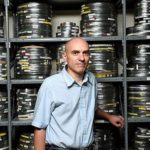 Timothy Wisniewski
Timothy Wisniewski
Timothy Wisniewski is the visual materials archivist at the Alan Mason Chesney Medical Archives of the Johns Hopkins Medical Institutions, where he manages an extensive collection of medical and health-related moving images, photographs and sound recordings. At Johns Hopkins, he also serves as chair of the university-wide Recorded Image and Sound Preservation Committee, coordinating collaborative audiovisual preservation efforts throughout the institution. He is a longtime organizer of Home Movie Day Baltimore and a curator of archival film events that fuse simultaneous projections with live experimental music. Outside of his archival work, Wisniewski is active in the international experimental music community as a composer, performer and record publisher. Wisniewski holds a BFA from the Maryland Institute, College of Art and an MLIS from the University of Pittsburgh.
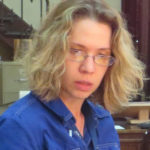 Sandra Yates
Sandra Yates
Sandra Yates is the Archivist & Special Collections Librarian for the McGovern Historical Center, Texas Medical Center Library in Houston, TX. She manages the preservation and access to the library’s special collections, including rare books, audiovisual materials, photographs, institutional records, personal papers, and digital materials. She worked in the film and production industry in Houston before receiving her MSIS from the University of Texas at Austin. She has been a core member of the Community Archiving Workshop (CAW) since 2011. Currently, she is the online resources consultant on the CAW Training of Trainers project, sponsored by AMIA with funding from the Institute of Museum and Library Services.
Heidi Ziemer
Heidi Ziemer serves as the Outreach & Digital Services Coordinator for the WNYLRC. She has been with WNYLRC for 30 years. Prior to this position she was Regional Archivist for the Council’s Documentary Heritage Program. Ziemer is responsible for assisting libraries in developing, preserving and promoting digital collections, including those that become part of New York Heritage and New York State Historic Newspapers digital repositories.
